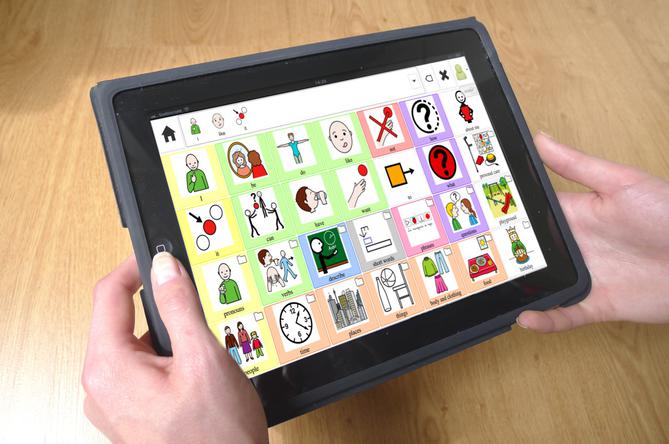Thomas is 5.
He lives with his family just up the street from me. I get to see him for two hours every weekend when he comes to a children’s class I teach — and occasionally during the week if he stops by my house to say hi.
Thomas has autism and he can’t speak much. His voice rarely tumbles out of his mouth, and when it does, it is generally difficult to understand. In a class full of youngsters, sometimes that means he can be overshadowed by a lively crew of voices all chirping for my attention.

But Thomas does have a voice — he wants to communicate. While pointing and guessing got us through for a while, relying on gestures was frustrating. Since I work for a company that has created an AAC (Augmentative and Alternative Communication) app, it occurred to me that this could be a big help to the boy in my class who didn’t have a voice. So at the beginning of this year, with his parents’ encouragement, we downloaded the app, CoughDrop, onto an old Android tablet and began using some basic AAC boards in our class. Thomas’ family is just starting to explore speech options for him, and this was an avenue they chose with the help of professionals.
Using AAC in class has been an adjustment for all of us. I needed to adjust my lessons to include opportunities for Thomas (along with the other children) to engage more clearly with the topic. I needed to learn to be patient and allow plenty of time for Thomas to respond. I needed to find ways to model language to help Thomas better understand how to communicate. But Thomas has inspired me, so I worked and planned and together we changed.
To start our class each week, using my own tablet, I pull up a copy of Thomas’ feelings board to tell my clutch of little learners how I am feeling that day. Then, I ask each of them in turn to use my device to tell me how they are feeling. Thomas watches intently as each set of small fingers excitedly navigates the buttons to share their thoughts.
Almost without exception, when it is his turn, Thomas uses his tablet to tell me (with a crooked grin) that he feels silly. He has a deliciously quirky personality and I love getting to know him better. And because we are all using the device to speak, Thomas isn’t left to feel out of place or strange.
A once silent boy has begun to bloom. I have watched as all the research I’ve read has come center stage on the child-sized chairs of my classroom. Once Thomas learned there was a way for the world to hear his voice, he took off. Suddenly he was ten times more vocal than he’d ever been before. I still don’t understand most of his words, but he speaks them regularly and even hums along when we sing. He was immersed in our activities, and there was a light in his eyes that had been missing until now.
With the help of AAC, Thomas answers questions in class, regularly requests a seat on my lap, and asks for his mom at some point almost every week. He often says “hello” to his classmates and occasionally tells them a word or two about his day.
Sometimes he speaks out of turn. Sometimes he shouts words that are off topic. Sometimes he starts up one of our downloaded children’s songs from his speech board when he gets bored (that can’t be right, my class is never boring).
He loves cars. He always prefers to be outside. His favorite means of movement is running!
He is just like every other 5-year-old.
Thomas may have trouble speaking, but thanks to augmentative communication and CoughDrop, I can hear his voice loud and clear.

